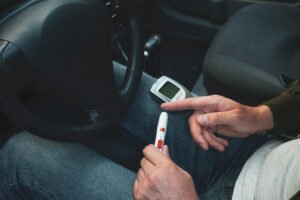
In Nevada, physicians and advanced practice registered nurses (APRNs) are required to notify the DMV if your epilepsy severely impairs your ability to safely drive a car or motorcycle. This notification must occur within 15 days of them determining that you should not be driving.1
When you get notified
Once a physician or an APRN in Nevada makes the determination – in their professional judgment – that you cannot drive due to your epilepsy, they must inform you of the dangers of driving in your condition.
In addition, the physician or APRN must then sign a written statement verifying that they informed you of the dangers. They should then give a copy of this statement (considered a healthcare record) to you.
It is this written statement that the physician or APRN must then provide to the Nevada Department of Motor Vehicles within 15 days of determining that your epilepsy should prevent you from driving. The DMV will then use this otherwise confidential statement to strip you of your driving privileges.2
Doctors and APRNs may use this official DMV “DLD-7” form as their written statement.
When the DMV gets notified
In Nevada, doctors and APRNs are required to notify the DMV about your epilepsy only if they determine that you should not be driving. If you are managing well and can drive safely, then the doctor or APRN does not need to tell the DMV about you.3
Suing your healthcare provider
When doctors or APRNs notify the Nevada DMV about you being a road safety risk, you cannot sue them unless they acted with:
- malice,
- intentional misconduct,
- gross negligence, or
- intentional or knowing violation of the law.
Note that doctors and APRNs are also immune from liability for not notifying the DMV about you unless you are too impaired by epilepsy to drive safely.4
Driving in Nevada if you get seizures
If you have epilepsy or insulin dependent diabetes, you may still be able to drive depending on your particular case. The DMV uses designated colors to differentiate the driver’s licenses of epileptics and diabetics from the general driving population.5
When seizures are mistaken for DUIs
If you were falsely accused of drunk driving or drugged driving in Nevada because the police mistook your seizure as intoxication, I would use your medical records to show the D.A. that the police made a mistake. Once prosecutors see this evidence, hopefully they will drop the charge completely.
The Department of Safety is supposed to educate police officers on how to distinguish between people suffering from seizures and people under the influence of alcohol or drugs. In my experience however, epileptics and diabetics continue to be accused of DUI by officers who fail to tell the difference.6

Epileptics and diabetics get arrested for DUI when officers mistake their seizures as inebriation.
Driving with epilepsy as a crime
It is a misdemeanor crime to drive in Nevada if a physician or APRN informed you that your epilepsy would severely impair your ability to safely operate a motor vehicle. Misdemeanors carry up to:
- six months in jail and/or
- $1,000 in fines.
If your physician or APRN finds out that you are continuing to drive anyway, they can submit a written report to the DMV. They are immune from liability whether they submit a report or decide not to submit one.7
Additional reading
For more in-depth information, refer to these scholarly articles:
- Individual state driving restrictions for people with epilepsy in the US – Neurology.
- Driving and Epilepsy: A Historical Perspective and Review of Current Regulations – Epilepsia.
- Understanding variability in driving recommendations for patients with seizures – Epilepsy and Behavior.
- Prevalence of Driving and Traffic Accidents among People with Seizures: A Systematic Review – Neuroepidemiology.
- Driving restrictions in patients with seizures; a review of the regulations from the English-speaking nations – Epilepsy and Behavior.
Legal References
- NRS 629.047.
- Same.
- Same.
- Same.
- NRS 483.348.
- Same.
- NRS 483.575.


